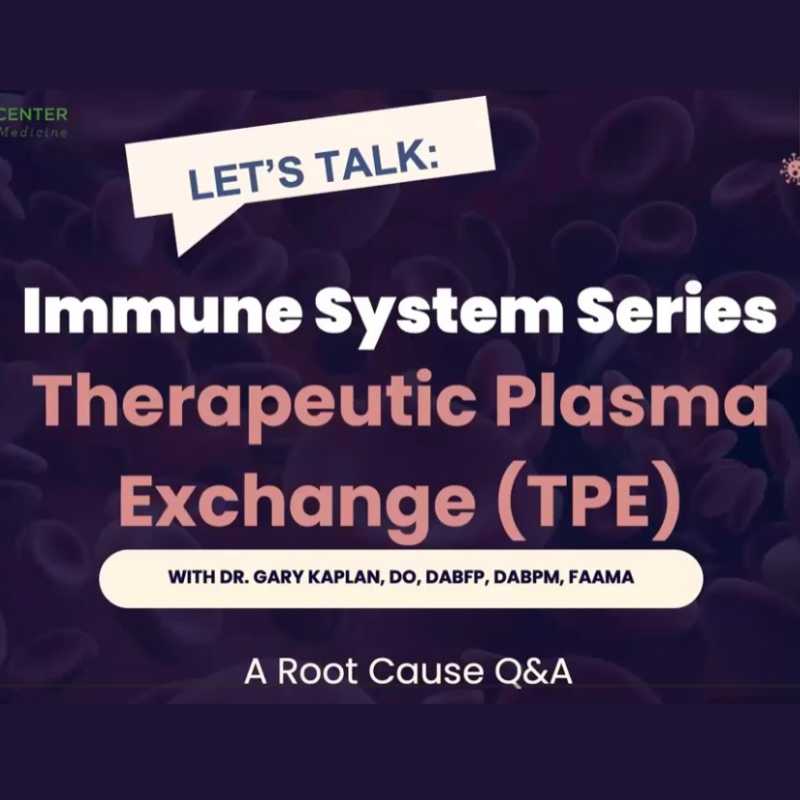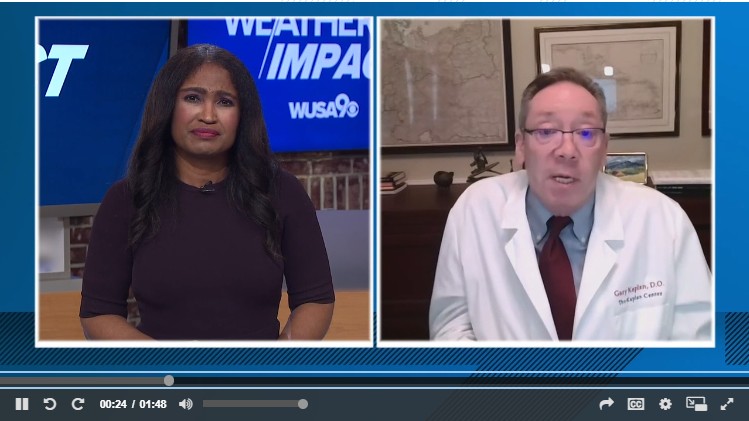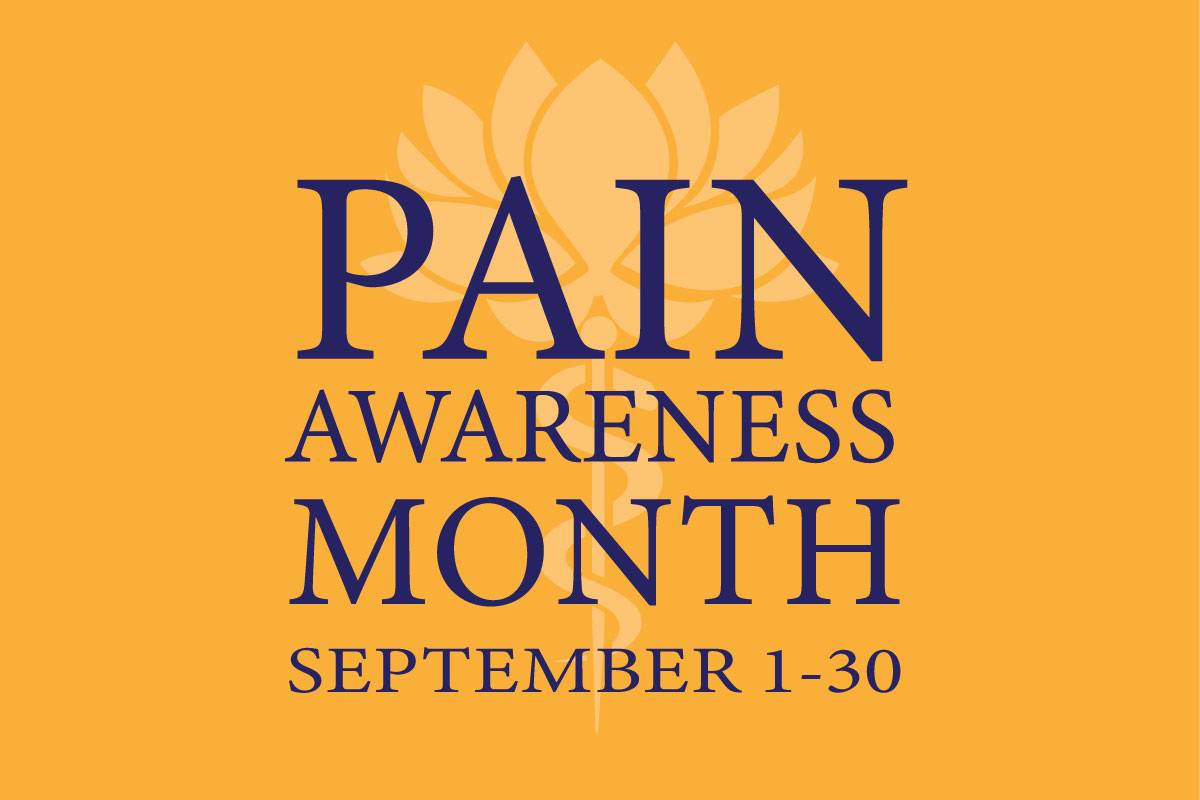
5 Ways We Can Keep Your Immune System Strong
December 10, 2025/by Kaplan Center
Want to Take Your Workout to the Next Level Next Year? These Tips Can Help
December 8, 2025/by Kaplan Center
Dr. Kaplan’s Dos and Don’ts of the Holiday Season
December 3, 2025/by Kaplan Center
Let’s Talk Webinar – A Root Cause Q&A
December 2, 2025/by Kaplan Center
Navigating Holiday Meals with Gut Issues: Simple Tips for a Comfortable Season
December 1, 2025/by Chardonée Donald, MS, CBHS, CHN, CNS, LDN
Craniosacral Therapy for TMJ | Say Goodbye to the Daily Grind
November 19, 2025/by Patricia Alomar, M.S., P.T.
From Compassionate Care to Personal Healing: A Letter to My Patients
November 18, 2025/by Kaplan Center
8 Steps to a Healthier Gut—and a Longer, Healthier Life
November 18, 2025/by Kaplan Center
Mid-Life Irritability & Fatigue Improved by Hormonal Balancing
November 13, 2025/by Lisa Lilienfield, MD
From Challenges to Change: Dr. Kaplan on Healthcare’s Biggest Challenges
October 29, 2025/by Kaplan Center
Overlooked Dangers of Mold Exposure and How to Stay Safe – Dr. Kaplan Talks to WUSA9
October 27, 2025/by Kaplan Center
Let’s ‘Fall’ Into Wellness: A Nutritionist-Approved Immune-Boosting Recipe for Cold and Flu Season
October 13, 2025/by Chardonée Donald, MS, CBHS, CHN, CNS, LDN
PANS/PANDAS – When Sudden Symptoms Signal Something More
October 9, 2025/by Kaplan Center
Beating Burnout, A Nutritionist’s Perspective
October 1, 2025/by Chardonée Donald, MS, CBHS, CHN, CNS, LDN
3 Things That Can Happen After Stopping GLP-1s
September 11, 2025/by Chardonée Donald, MS, CBHS, CHN, CNS, LDN
What Families Need to Know About COVID and Flu Season
September 3, 2025/by Kaplan Center
September is Pain Awareness Month
September 1, 2025/by Kaplan Center
Dr. Kaplan Spoke to Northern Virginia Magazine About COVID, Flu, and Immunity — Here’s What You Should Know
August 14, 2025/by Kaplan Center
“Why Do I Feel Like Crap?”: The Overlap Between Long COVID and Perimenopause
July 30, 2025/by Kaplan Center
Why People Are Turning to EMDR (and Why You Might Want to Too)
July 23, 2025/by Kaplan CenterAre you looking to improve your overall wellness?
Personalized care you can trust.
Our integrative, non-surgical treatment approach is highly successful in maintaining wellness and also treating chronic pain and illness. For more than 30 years, we have delivered superior, cutting-edge health care in the Washington, DC area.
QuickLinks
Contact Information
Tel: 703-532-4892
Fax: 703-237-3105
6829 Elm Street, Suite 300
McLean, Virginia 22101
Map It
Hours of Operation
Mon – Thu : 8 am – 5 pm, ET
Fri : 8 am – 12 pm, ET
Treating Chronic Pain
/in Long Covid, Treatments/by Gary Kaplan, DOThe number of patients diagnosed with chronic pain conditions continues to rise in the United States, topping 51 million in 2021. 1
Chronic pain is defined as pain that lasts for more than 3 months, a time frame that under normal circumstances should accommodate the body’s normal healing process. But when the body doesn’t respond how we expect it to, lives can quickly be interrupted, and for many, it can be life-shattering.
Chronic pain is treatable and there are many effective options available, so why are millions of people being left behind?
One of the biggest challenges in diagnosing and managing chronic pain is the fact that providers have to rely almost exclusively on the individual’s description of their pain and the disability it causes. Pain is subjective – there is no biomarker, blood test, or imaging study that can objectively detect the presence and severity of pain.
However, research that looks at the way our brains and nervous systems initiate and sustain severe chronic pain continues to point to the same conclusion – that chronic pain, in and of itself, is not the problem to be treated. Instead, chronic pain should be seen as a symptom of an underlying medical problem, and it is to this underlying problem that treatment must be targeted.
Specifically, chronic pain is a symptom of inflammation in the brain, or what I call “a brain on fire”. This inflammation is triggered by the body’s own immune system, which is designed to respond to any kind of assault. For example, physical injury, infections (such as Lyme disease or COVID-19), exposure to environmental toxins, concussions, celiac disease, loss of oxygen to the brain caused by sleep apnea, and even long-term emotional trauma, can set off an inflammatory response in the brain and central nervous system. Identifying the source(s) of inflammation is critical to breaking the cycle of chronic pain; and frequently, the sources are multiple, compounding, and cumulative.
To accurately diagnose and treat the causes of neuroinflammation that manifest as chronic pain, providers must:
Pain Management Programs
Intensive pain management programs can be an extremely important tool in helping patients manage their pain and live a better life. They typically involve a treatment schedule that spans several weeks, during which time attendees are typically seen by a team of healthcare providers with a variety of specialties. Although programs vary somewhat from one to another, each is likely to include:
The goal of this type of intense programming with an emphasis on education is to help individuals think differently about their pain while providing them with new tools to manage their pain and re-engage in their lives. Additionally, if the programs are designed to approach pain as a symptom of an underlying medical condition and the treatment aims to resolve the root cause of the pain, there is a very good possibility that the pain will go away.
The Bottom Line
What Needs to Happen
Individuals suffering from chronic pain must, in every single case, be offered a comprehensive workup with an individualized treatment approach.
We need to continue with research into the causes of inflammation in the brain, while also working on developing a treatment for brain inflammation that leads to chronic pain. We also need to develop testing that will provide us with an objective indicator of the chronic pain/underlying disease and its response to treatment.
In the interim, we should focus on improving the lives of our patients by using targeted therapies that address the biology of the pain, rather than its symptoms; anything short of this is like putting a Band-Aid on a bullet hole.
–Dr. Gary Kaplan
Sources:
1. Rikard SM, Strahan AE, Schmit KM, Guy GP Jr.. Chronic Pain Among Adults — United States, 2019–2021. MMWR Morb Mortal Wkly Rep 2023;72:379–385. DOI: http://dx.doi.org/10.15585/mmwr.mm7215a1.
2. PMID: 24308846
3. PMID: 25840040
4. PMID: 26824399
5. PMCID: PMC3777049
Long-COVID Recovery Program
Our Long-COVID Recovery Program provides comprehensive care to patients who still have COVID-19 symptoms more than six weeks after recovering from the initial infection. If you are experiencing symptoms beyond six weeks of being diagnosed, please give us a call at 703-532-6302.
We are here for you, and we want to help.
Our goal is to return you to optimal health as soon as possible. To schedule an appointment please call: 703-532-4892 x2
This article was originally published in September 2016. It was reviewed and updated in September 2023.
Healthy Aging Can Be A Balancing Act
/in Wellness/by Jeanne Scheele, PTHave you ever been in a situation where your mind said, “You can do it! You can do it!,” then your body said, “No, STOP – you can’t!”? In the case of a fall, it’s possible that the second message came a little too late.
Most of us know exactly what it feels like to experience a fall. It can be a very scary moment when you know you have lost your balance and a fall is imminent. Oftentimes, there is nothing you can do about it but hope for a soft landing and no fractures.
In the United States, nearly one-fourth of adults over 65 fall annually, causing 95% of the hip fractures seen each year. Among older adults, falling has become the leading cause of fatal and non-fatal injuries.
So – what is this thing called BALANCE, and why does it get worse with aging?
Balance is a state of equilibrium where there is an even distribution of weight enabling someone to remain upright and steady. Having good balance means having control over your body’s position, whether you are moving or remaining still. Ahhh… if only that would stay with us as we age. The unfortunate reality is that our risk and frequency of falling increases the older we get because our natural ability to maintain balance is compromised by a number of factors, including:
*With aging comes osteoarthritis which affects these weight-bearing joints.
4 steps you can take to decrease your risk of falling:
If you think you could be at risk for a fall, make sure to have a talk with your physician or physical therapist to relay your concerns as soon as possible. You can always do something to feel and move better!!
We are here for you, and we want to help.
Our goal is to return you to optimal health as soon as possible. To schedule an appointment please call: 703-532-4892 x2
Suffering from Long-COVID Symptoms? Help is Available
/in COVID-19, Long Covid, Wellness/by Kaplan CenterA recent op-ed in the Washington Post, written by American author Madeline Miller, describes how living with Long COVID has changed her life. She details her frustration, her fears, and the daily struggles she endures with no knowledge of when it will end. Unfortunately, her story is not unique…
As a practice specializing in chronic illnesses, we understand the physical, emotional, and mental toll that conditions such as Long COVID can take on your life.
We understand that living with unanswered questions, the fear of being doubted, and the persistence of your symptoms may leave you feeling frustrated, isolated, and disheartened.
We understand that though research is progressing rapidly, and medical professionals are learning more and more about this complex condition every day, these words may be of little consolation.
Like other complex chronic illnesses, Long COVID causes a wide range of new, returning, or ongoing health problems which can quickly derail your life. But we want to assure you that you are not alone and there is hope.
Long COVID is a multi-system condition that looks a lot like other chronic illnesses we have seen in our clinic that have started with an infection. But, with the right support team and a multidisciplinary treatment approach in place, you will find ways to adapt, cope and heal.
Our message to you is: Do not hesitate to seek support from your loved ones, healthcare providers, and mental health professionals. Self-compassion and patience will be essential companions on your journey and every step you take, no matter how small, is a step towards healing.
We have multi-disciplinary services at our Center for people with Long COVID symptoms. We have decades of experience treating complex conditions and we’re ready to help you address the physical and emotional impacts of this disease. Please give us a call to find out how we can help you improve the quality of your life today.
OPINION | Long COVID has derailed my life. Make no mistake: It could yours, too.
By Madeline Miller, August 9, 2023
In 2019, I was in high gear. I had two young children, a busy social life, a book tour and a novel in progress. I spent my days racing between airports, juggling to-do lists and child care. Yes, I felt tired, but I come from a family of high-energy women. I was proud to be keeping the sacred flame of Productivity burning.
Then I got covid.
Continue reading >> https://www.washingtonpost.com/opinions/2023/08/09/madeline-miller-long-covid-post-pandemic/
We are here for you, and we want to help.
Our goal is to return you to optimal health as soon as possible. To schedule an appointment please call: 703-532-4892 x2